新概念英语第三册语法总结:虚拟语气
新概念英语第三册虚拟语气课件

Answers for Exercise 3 on page 5 1. David is not a sculptor. If he were, he
would make a sculpture for the exhibition.
2. Sally is not an aggressive woman. If she were, she would be a more successful business woman.
If I were a bird, I could fly in the sky freely. If I were you, I would try my best to grasp the
chance.
条件句的分类
真实条件句:表示现实情况中可能实现的情 况。真实条件句中的谓语动词一般用一般现 在时代替一般将来时,用一般过去时代替过 去将来时。
3. If Sam were here, he would be so excited about meeting a famous scholar in the flesh.
4. If I could paint, I would paint you an abstract painting in the style of Matisse.
If条件句中虚拟语气的形式
假设 情况
将来
if从句谓语形式
一般过去式(be用were) should + 动词原形 were to + 动词原形
主句谓语形式
would / should / might / could +
动词原形
现在 过去
一般过去式(be 用 were)
新概念第三册核心语法整理

单元二:倒装句(1)否定词在前的情况完全倒装:谓语部分倒装:助动词(系动词+情态动词)1.no sooner had he arrived than they asked him to l eave again.2.Hardly had he begun to speak when the audience interrupted him.3.Not until he comes back will I go to sl eep(not until 主句部分倒装,从句不倒装)4.Not until 1895 did Cornell University begin to offer a d egree in ornithol ogy.5.Not until linol eum was invented in 1860 did any house have hard-wearing,easy-to-cl ean fl ooring.6.At no time shoul d we divorce ourselves from the masses of the peopl e.(部分倒装)7.Not a singl e paper did he write l ast term.8.Nor for a moment can the man imagine that he woul d die abroad.倒装句(2)让步状语从句形容词/副词/名词+ as/ though +主语+谓语1.much as we may pride ourselves on our god taste, we are no l onger free tochoose the things we want.(副词)2.old as I am, I can still fight.(形容词)3.chil d though he is , he can do some cooking.(名词)动词(原型)+as/though+主语+助动词/情态动词1.try as I might, I coul d not lift the stone.2.Try hard as he will, he never seems abl e to do the word satisfactorily.特殊:as引导的原因状语从句也可以用倒装:tired as she was , I decided not to disturb her.长句:3.great succes s though you have achieved, you must not be conceited.4.Run dry as the see were to and crumble as the rocks were to , I woul d notbreak my promise.5.Only for one year as she has been here, she become quite an expert in thisfiel d.倒装句(3)方位副词前置there, here ,now ,then和up, d own, in , out等副词在句首,要完全倒装1.there appeared on the horizon a man on horseback, riding in my direction.Now comes your luck. Out rushed the littl e boy.主语是代词的时候不用倒装2.here he comes.3.Out he rushed.倒装句(4)补充地点介词短语:1.behind him hang the map.2.In this box is found the book.分词短语:1.lying on the fl oo r was a boy aged about fifteen.2.Discussed in the conference was a proposal to reform income taxes.表语(形容词,过去分词,介词短语):1.invicible are the forces of the pl2.gone are the days when were student s.3.Among the goods are appl es, oranges, bananas····同位语从句why:my original question why he do it has not been answered.Whether: he was again tortured by the doubt whether he coul d meet Mary at the station.单元三:独立主格结构:表示时间,原因,条件,方式和伴随情况自己主语+无动词分句现在分词:weather permitting, I will start tomorrow.过去分词:his homework done , Jim decided to go and see the pl ay.无动词独立结构:the meal over ,we began to work again.不定式独立结构:the detail s to be worked out l ater, the pl an was approved. With 引导的独立主格结构定语:the woman with a baby on her back is my sister原因状语:with his homework finished , he felt very happy.伴随状语:with his face covered tears, he ran into the room. With tears streaming down her cheeks, she sat there .1.sand is formed by the weathering and d ecomposition of all types of rock, it smost abundant mineral constitution being quart s.2.The job finished ,we went home st raight away.3.Two hundred peopl e died in the accident, many of them chil dren.4.There being nothing el se to do ,we l eft.5.I woul d not dare to go home without the job finished.过去分词作宾语补足语(-ed)See,hear,feel ,find ,think·······1.I saw the student s assembled in the hall.2.They found a beautifully-cooked wall et and notes turned to ash.单元四:原因状语从句:because , sine , as , now that, fornow that= seeing that =in that=considering thatthis machine differs from the other one in that it is more powerful.双重否定never fail to: cat s never fail t o fascinate human beingsnot without: he doesn’t have any meal without meat sno not: there is nothing that he can’t d o.单元五:so that 别忘了还有表示结果的意思:we all arrived at 8:00 so that the meeting began promptly.So···that···倒装:主句部分倒装,that从句不倒装1.So great is our passion for doing things for ourselves , that we are becomingincreasingly l ess dependent on specialized l abour.2.So quickly did the workmen finish their work that they were given a bonus.3.So inferior was the quality of the radio that I took it back and asked for abetter one.4.To such a degree was he hurt that he woul d never forgive you.Such+ a +形容词+ 单数名词=so+形容词+a+单数名词1.He was in such a bedraggl ed condition that an assistant refused to serve him.2.He was in so bedraggl ed a condition that····3.It was so hot a day that we went swimming.4.It is such nice weather that I woul d like to o the beach.(weather为不可数名词,只能用such)特殊:当强调的名词前有many, few, litter时,还是用so1.he took so many cases with him that he had to call a taxi2.he earned so littl e money that he coul d barely support his family.让步状语从句:though although (不能用but,但可以用yet强调转折)though she is not pretty, yet she is very l ovely.单元六:现在分词作状语同时发生:flying over the channel , the pil ot saw a meteorite.动作发生在主句之前:having noted d own our names ,the policeman dismissed us.条件状语:you will only make yourself more tired, keeping on your feet.结果:he applied more water to the fl ower, only making things worse.(结果置于句末,多和only 连用)单元七:woul d rather ···than····接动词原型:pl woul d rather pay l arge sums of money than have their life work destroyed by gangsters.It is time / Woul d rather +从句:虚拟语气,宁愿让某人干某事。
新概念英语第三册语法精粹(四):虚拟语气
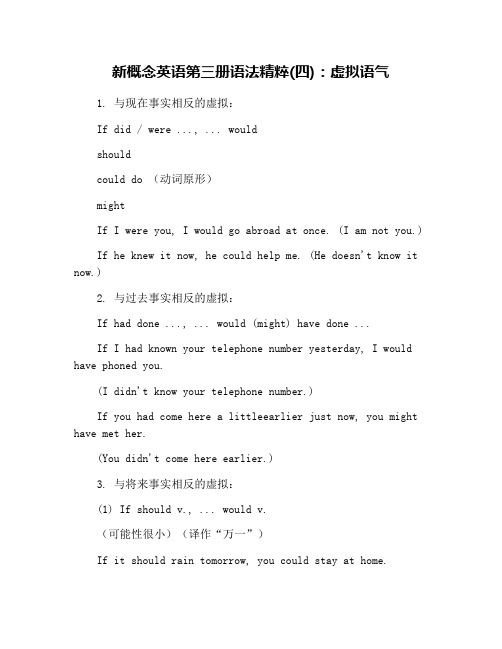
新概念英语第三册语法精粹(四):虚拟语气1. 与现在事实相反的虚拟:If did / were ..., ... wouldshouldcould do (动词原形)mightIf I were you, I would go abroad at once. (I am not you.)If he knew it now, he could help me. (He doesn't know it now.)2. 与过去事实相反的虚拟:If had done ..., ... would (might) have done ...If I had known your telephone number yesterday, I would have phoned you.(I didn't know your telephone number.)If you had come here a littleearlier just now, you might have met her.(You didn't come here earlier.)3. 与将来事实相反的虚拟:(1) If should v., ... would v.(可能性很小)(译作“万一”)If it should rain tomorrow, you could stay at home.If I should fail, what should Ido?(2) If did / were to v ..., would v.(完全不可能)If the sun were to rise in the west, I would lend you the money.If you finished it in 3 minutes, I would give you my car.4. 金牌特殊重点:!![简单联想记忆]:● 下列动词后的“宾语从句”中需要用虚拟形式,即should 动词原形,shoud在美国英语中要省略(TOEFL语法考点)。
虚拟语气语法总结
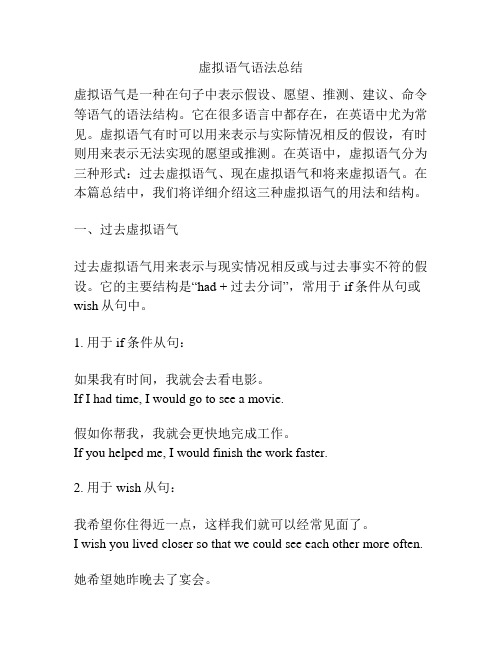
虚拟语气语法总结虚拟语气是一种在句子中表示假设、愿望、推测、建议、命令等语气的语法结构。
它在很多语言中都存在,在英语中尤为常见。
虚拟语气有时可以用来表示与实际情况相反的假设,有时则用来表示无法实现的愿望或推测。
在英语中,虚拟语气分为三种形式:过去虚拟语气、现在虚拟语气和将来虚拟语气。
在本篇总结中,我们将详细介绍这三种虚拟语气的用法和结构。
一、过去虚拟语气过去虚拟语气用来表示与现实情况相反或与过去事实不符的假设。
它的主要结构是“had + 过去分词”,常用于if条件从句或wish从句中。
1. 用于if条件从句:如果我有时间,我就会去看电影。
If I had time, I would go to see a movie.假如你帮我,我就会更快地完成工作。
If you helped me, I would finish the work faster.2. 用于wish从句:我希望你住得近一点,这样我们就可以经常见面了。
I wish you lived closer so that we could see each other more often. 她希望她昨晚去了宴会。
She wishes she had gone to the party last night.二、现在虚拟语气现在虚拟语气用来表示与现实情况相反或不太可能实现的愿望、建议、要求等。
它的主要结构是“should + 动词原形”或“were + to + 动词原形”。
1. 用于虚拟的愿望:如果我是你,我会马上辞职。
If I were you, I would quit my job immediately.(“were”表示与现实情况相反的假设)我希望你明白我的意思。
I wish you understood what I mean.(“understood”表示与现实情况不符的愿望)2. 用于虚拟的建议和要求:你应该尽早去看医生。
新概念英语虚拟语气语法讲解
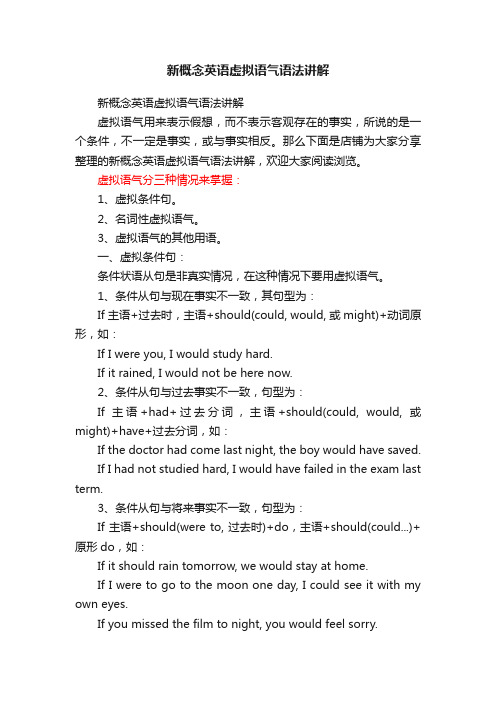
新概念英语虚拟语气语法讲解新概念英语虚拟语气语法讲解虚拟语气用来表示假想,而不表示客观存在的事实,所说的是一个条件,不一定是事实,或与事实相反。
那么下面是店铺为大家分享整理的新概念英语虚拟语气语法讲解,欢迎大家阅读浏览。
虚拟语气分三种情况来掌握:1、虚拟条件句。
2、名词性虚拟语气。
3、虚拟语气的其他用语。
一、虚拟条件句:条件状语从句是非真实情况,在这种情况下要用虚拟语气。
1、条件从句与现在事实不一致,其句型为:If 主语+过去时,主语+should(could, would, 或might)+动词原形,如:If I were you, I would study hard.If it rained, I would not be here now.2、条件从句与过去事实不一致,句型为:If 主语+had+过去分词,主语+should(could, would, 或might)+have+过去分词,如:If the doctor had come last night, the boy would have saved.If I had not studied hard, I would have failed in the exam last term.3、条件从句与将来事实不一致,句型为:If 主语+should(were to, 过去时)+do,主语+should(could...)+原形do,如:If it should rain tomorrow, we would stay at home.If I were to go to the moon one day, I could see it with my own eyes.If you missed the film to night, you would feel sorry.注意问题:1、If条件句中绝对不可出现"would"。
虚拟语气的总结总览

虚拟语气的总结总览虚拟语气是一种语法现象,用于表达非现实的情况、假设的情况或者推测的情况。
在中文中,虚拟语气主要通过动词的词形变化来表示,而在英语中,虚拟语气除了动词词形变化外,还可以通过其他语法结构来表示。
在英语中,虚拟语气主要有三种形式:虚拟条件句、虚拟愿望句和虚拟建议句。
1. 虚拟条件句:用于表示假设的情况或者与事实相反的情况。
虚拟条件句有三种形式:与过去事实相反的假设、与现在事实相反的假设和与将来事实相反的假设。
- 与过去事实相反的假设:形式为"if + 过去完成时,would/could/might + 动词原形"。
例如:"If I had studied harder, I would have passed the exam."(如果我研究更努力,我就能通过考试。
)- 与现在事实相反的假设:形式为"if + 过去时,would/could/might + 动词原形"。
例如:"If I were you, I would go on the trip."(如果我是你,我会去旅行。
)- 与将来事实相反的假设:形式为"if + 过去完成时,would/could/might + have + 过去分词"。
例如:"If it hadn't rained, we would have gone to the beach."(如果没有下雨,我们就去海滩了。
)2. 虚拟愿望句:用于表示对现在或将来的非现实愿望或希望。
虚拟愿望句有两种形式:对现在的愿望和对将来的愿望。
- 对现在的愿望:形式为"虚拟语气的过去时/现在时 +would/could/might + 动词原形"。
例如:"I wish I were taller."(我希望自己更高。
高中英语知识点归纳虚拟语气的用法和种类

高中英语知识点归纳虚拟语气的用法和种类虚拟语气是英语语法中的一个重要部分,它用来表达与现实事实相反、与过去事实相反、与将来事实相反和与现在事实相反的情况。
掌握虚拟语气的用法和种类对于高中英语学习者来说至关重要。
本文将对虚拟语气的用法和种类进行归纳总结。
一、与现实事实相反的虚拟语气1. 虚拟条件句虚拟条件句用来表示与现实相反的情况。
它的一般形式是:if + 主语(过去式)、主语(were) + 动词的过去分词,主语 +would/should/might/could + 动词原形。
例如:- If I were a bird, I would fly in the sky.(如果我是一只鸟,我会在天空中飞翔。
)- If he had studied harder, he would have passed the exam.(如果他学得更努力,他就会通过考试。
)2. 虚拟表达愿望或建议的句子虚拟语气在表达愿望或建议时常常被使用,常见的形式是:主语 + 过去式 + 动词原形。
例如:- I wish I had more time to travel.(我希望有更多的时间旅行。
)- She suggested that he go to the library.(她建议他去图书馆。
)二、与过去事实相反的虚拟语气1. 过去完成时的虚拟语气过去完成时的虚拟语气表示过去某个时间已经发生但实际并未发生的情况,常用的形式是:had + 动词的过去分词。
例如:- If I had known you were coming, I would have prepared a meal.(如果我知道你要来了,我会准备一顿饭的。
)- He wished he had studied harder when he was in high school.(他希望当他还在高中时学习更努力。
)2. 过去简单时的虚拟语气过去简单时的虚拟语气表示过去某个时间未发生的情况,常用的形式是:动词的过去式。
虚拟语气的用法归纳记忆口诀
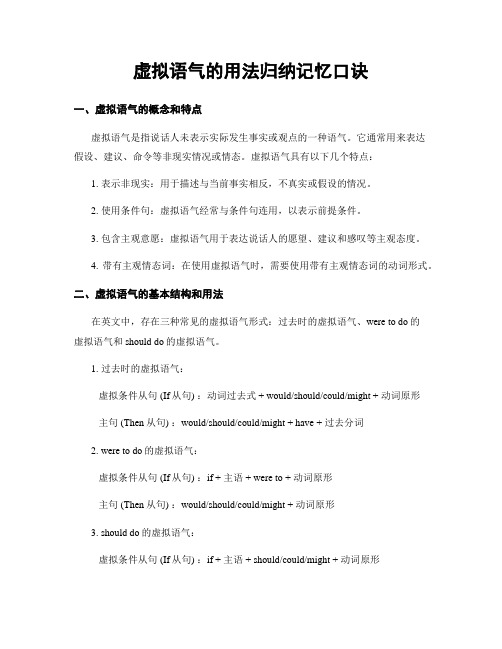
虚拟语气的用法归纳记忆口诀一、虚拟语气的概念和特点虚拟语气是指说话人未表示实际发生事实或观点的一种语气。
它通常用来表达假设、建议、命令等非现实情况或情态。
虚拟语气具有以下几个特点:1. 表示非现实:用于描述与当前事实相反,不真实或假设的情况。
2. 使用条件句:虚拟语气经常与条件句连用,以表示前提条件。
3. 包含主观意愿:虚拟语气用于表达说话人的愿望、建议和感叹等主观态度。
4. 带有主观情态词:在使用虚拟语气时,需要使用带有主观情态词的动词形式。
二、虚拟语气的基本结构和用法在英文中,存在三种常见的虚拟语气形式:过去时的虚拟语气、were to do的虚拟语气和should do的虚拟语气。
1. 过去时的虚拟语气:虚拟条件从句 (If从句) :动词过去式 + would/should/could/might + 动词原形主句 (Then从句) :would/should/could/might + have + 过去分词2. were to do的虚拟语气:虚拟条件从句 (If从句) :if + 主语 + were to + 动词原形主句 (Then从句) :would/should/could/might + 动词原形3. should do的虚拟语气:虚拟条件从句 (If从句) :if + 主语 + should/could/might + 动词原形主句 (Then从句) :would/should/could/might + 动词原形虚拟语气常用于以下情况:1. 假设与非真实情况:用来表达假设、虚构或非现实的情况。
2. 表达建议:用来提出建议或希望对方采取某种行动。
3. 发出命令:用于发出间接或婉转的命令,表示说话人的勉励或要求。
4. 表示愿望和欲望:用于表达个人对特定情况的愿望和欲望。
三、常见虚拟语气的短语动词和习惯用法以下是一些常见的虚拟语气短语动词和习惯用法,我们可以通过记忆口诀来帮助记忆:1. 表示建议的短语动词:(口诀:Will you please give up the idea and let him be?)- suggest:建议- recommend:推荐- advise:劝告- urge:敦促- propose:提议- insist:坚持2. 表示要求的短语动词:(口诀:I demand that he pay his debt.)- request:要求- demand:要求- require:需要- command:命令- order:订单3. 表示愿望的短语动词:(口诀1. Do I wish for a million dollars? 祝你明年变富豪!)(口诀2. If only + 主语 + could + 动词原形,多少 + 意愿– I wish + 句子 (果果特爱游戏。
英语中的虚拟语气用法总结
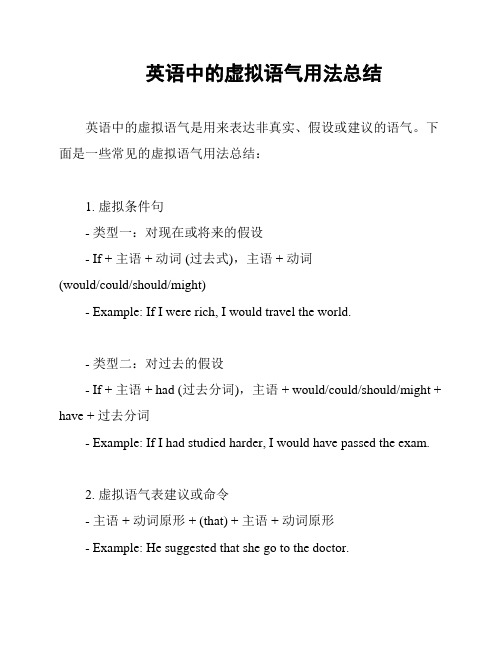
英语中的虚拟语气用法总结英语中的虚拟语气是用来表达非真实、假设或建议的语气。
下面是一些常见的虚拟语气用法总结:1. 虚拟条件句- 类型一:对现在或将来的假设- If + 主语 + 动词 (过去式),主语 + 动词(would/could/should/might)- Example: If I were rich, I would travel the world.- 类型二:对过去的假设- If + 主语 + had (过去分词),主语 + would/could/should/might + have + 过去分词- Example: If I had studied harder, I would have passed the exam.2. 虚拟语气表建议或命令- 主语 + 动词原形 + (that) + 主语 + 动词原形- Example: He suggested that she go to the doctor.3. 虚拟语气表愿望- 类型一:对现在或将来的愿望- 主语 + wish/es + 主语 + 动词过去式- Example: I wish I were taller.- 类型二:对过去的愿望- 主语 + wish/es + 主语 + 过去完成时- Example: I wish I had studied more.4. 虚拟语气表态度或建议- It is (high) time + 主语 + 过去式- Example: It is time that she left.- 主语 + would rather + 主语 + (did) + 动词原形- Example: She would rather he didn't smoke.这些是英语中常用的虚拟语气用法总结。
希望对您有帮助!。
虚拟语气用法知识点总结
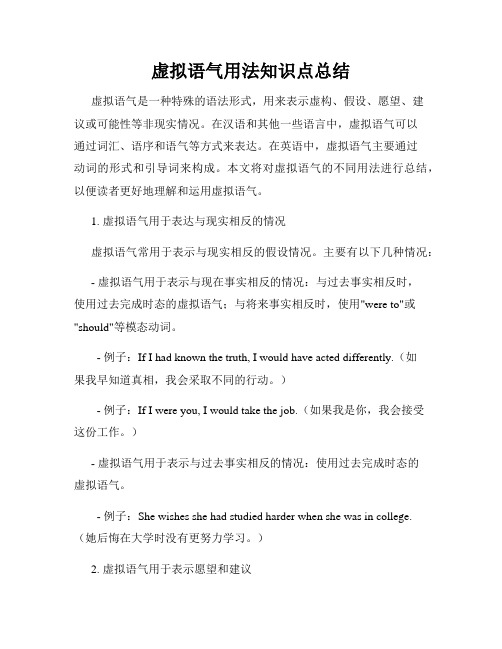
虚拟语气用法知识点总结虚拟语气是一种特殊的语法形式,用来表示虚构、假设、愿望、建议或可能性等非现实情况。
在汉语和其他一些语言中,虚拟语气可以通过词汇、语序和语气等方式来表达。
在英语中,虚拟语气主要通过动词的形式和引导词来构成。
本文将对虚拟语气的不同用法进行总结,以便读者更好地理解和运用虚拟语气。
1. 虚拟语气用于表达与现实相反的情况虚拟语气常用于表示与现实相反的假设情况。
主要有以下几种情况:- 虚拟语气用于表示与现在事实相反的情况:与过去事实相反时,使用过去完成时态的虚拟语气;与将来事实相反时,使用"were to"或"should"等模态动词。
- 例子:If I had known the truth, I would have acted differently.(如果我早知道真相,我会采取不同的行动。
)- 例子:If I were you, I would take the job.(如果我是你,我会接受这份工作。
)- 虚拟语气用于表示与过去事实相反的情况:使用过去完成时态的虚拟语气。
- 例子:She wishes she had studied harder when she was in college.(她后悔在大学时没有更努力学习。
)2. 虚拟语气用于表示愿望和建议虚拟语气还常用于表示愿望和建议。
主要有以下几种情况:- 虚拟语气用于表示与现在的愿望:使用"would rather"或"had better"等模态动词。
- 例子:I would rather you came earlier.(我希望你早点来。
)- 例子:You had better be careful.(你最好小心。
)- 虚拟语气用于表示与将来的愿望:使用"would like to"或"wouldlove to"等词组。
新概念英语第三册语法详解和总结(带习题)
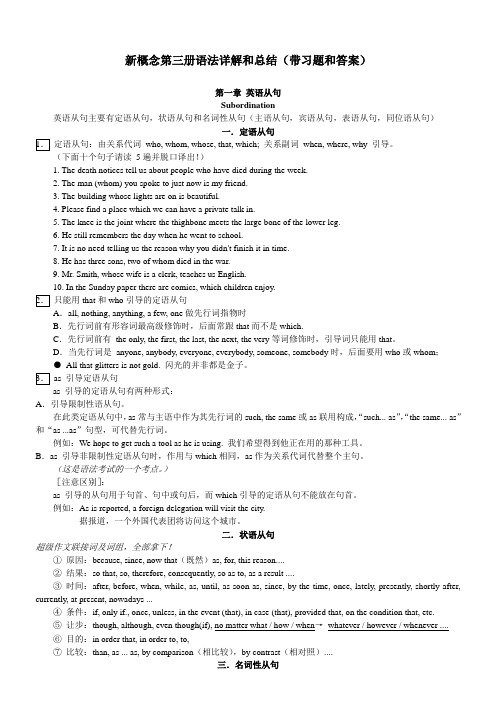
新概念第三册语法详解和总结(带习题和答案)第一章英语从句Subordination英语从句主要有定语从句,状语从句和名词性从句(主语从句,宾语从句,表语从句,同位语从句)一.定语从句定语从句:由关系代词who, whom, whose, that, which; 关系副词when, where, why 引导。
(下面十个句子请读5遍并脱口译出!)1. The death notices tell us about people who have died during the week.2. The man (whom) you spoke to just now is my friend.3. The building whose lights are on is beautiful.4. Please find a place which we can have a private talk in.5. The knee is the joint where the thighbone meets the large bone of the lower leg.6. He still remembers the day when he went to school.7. It is no need telling us the reason why you didn't finish it in time.8. He has three sons, two of whom died in the war.9. Mr. Smith, whose wife is a clerk, teaches us English.10. In the Sunday paper there are comics, which children enjoy.只能用that和who引导的定语从句A.all, nothing, anything, a few, one做先行词指物时B.先行词前有形容词最高级修饰时,后面常跟that而不是which.C.先行词前有the only, the first, the last, the next, the very等词修饰时,引导词只能用that。
英语虚拟语气语法总结
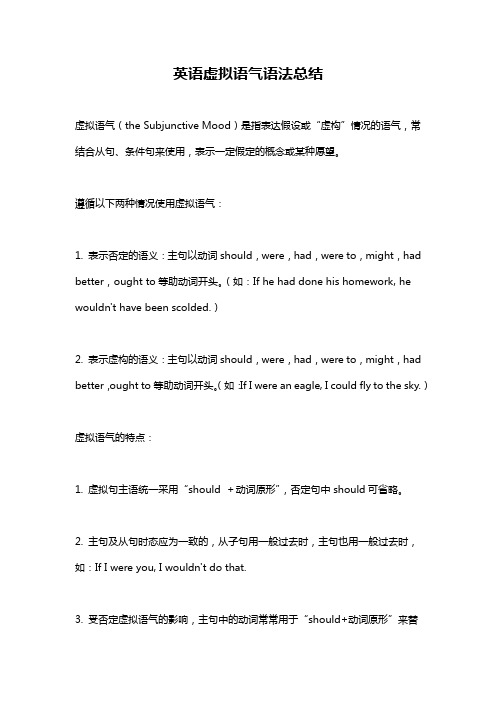
英语虚拟语气语法总结
虚拟语气(the Subjunctive Mood)是指表达假设或“虚构”情况的语气,常结合从句、条件句来使用,表示一定假定的概念或某种愿望。
遵循以下两种情况使用虚拟语气:
1. 表示否定的语义:主句以动词should,were,had,were to,might,had better,ought to等助动词开头。
(如:If he had done his homework, he wouldn't have been scolded.)
2. 表示虚构的语义:主句以动词should,were,had,were to,might,had better,ought to等助动词开头。
(如:If I were an eagle, I could fly to the sky.)
虚拟语气的特点:
1. 虚拟句主语统一采用“should +动词原形”,否定句中should可省略。
2. 主句及从句时态应为一致的,从子句用一般过去时,主句也用一般过去时,如:If I were you, I wouldn't do that.
3. 受否定虚拟语气的影响,主句中的动词常常用于“should+动词原形”来替
代正常句式中的情态动词,如:He should do that.
4. 受虚拟语气的影响,主句中的动词常常改用were来代替be,如:If he were here now, what would you say to him?。
新概念英语第3册语法

新概念第三册语法精粹第一章英语从句Subordination英语从句主要有定语从句,状语从句和名词性从句(主语从句,宾语从句,表语从句,同位语从句)一.定语从句定语从句:由关系代词who,whom, whose, that,which; 关系副词when, where,why 引导。
(下面十个句子请读5遍并脱口译出!)1。
The death notices tell us about people who have died during the week.2. The man (whom) you spoke to just now is my friend.3。
The building whose lights are on is beautiful.4。
Please find a place which we can have a private talk in。
5. The knee is the joint where the thighbone meets the large bone of the lower leg.6。
He still remembers the day when he went to school。
7。
It is no need telling us the reason why you didn't finish it in time.8。
He has three sons, two of whom died in the war。
9。
Mr. Smith,whose wife is a clerk, teaches us English。
10. In the Sunday paper there are comics, which children enjoy。
只能用that和who引导的定语从句A.all,nothing,anything, a few,one做先行词指物时B.先行词前有形容词最高级修饰时,后面常跟that而不是which。
- 1、下载文档前请自行甄别文档内容的完整性,平台不提供额外的编辑、内容补充、找答案等附加服务。
- 2、"仅部分预览"的文档,不可在线预览部分如存在完整性等问题,可反馈申请退款(可完整预览的文档不适用该条件!)。
- 3、如文档侵犯您的权益,请联系客服反馈,我们会尽快为您处理(人工客服工作时间:9:00-18:30)。
新概念英语第三册语法总结:虚拟语气
虚拟语气用来表达不可能或难以实现的愿望,与事实相反的假设,通常分为基本的三种形式。
1. 与现在事实相反的虚拟:
If + did / were + ..., ... would/ should/ could/ might + do (动词原形)
If I were you, I would go abroad at once. (I am not you.)
If he knew it now, he could help me. (He doesn't know it now.)
2. 与过去事实相反的虚拟:
If + had done + ..., ... would (might) have done ...
If I had known your telephone number yesterday, I would have phoned you. (I didn't know your telephone number.)
If you had come here a little earlier just now, you might have met her. (You didn't come here earlier.)
3. 与将来事实相反的虚拟:
(1) If + should + v., ... would + v. (可能性很小)(译作“万一”)
If it should rain tomorrow, you could stay at home.
If I should fail, what should Ido?
(2) If + did / were to + v ..., would + v. (完全不可能)
If the sun were to rise in the west, I would lend you the money.
If you finished it in 3 minutes, I would give you my car.
4. 金牌特殊重点
[简单联想记忆]:
● 下列动词后的“宾语从句”中需要用虚拟形式,即should + 动词原形,shoud在美国英语中要省略(TOEFL语法考点)。
此类常见的动词有:order, ask, decide, demand, require, recommend, suggest (建议), insist(坚决要求), advise, etc.
He suggested that we (should) help them with English.
The teacher ordered that the homework (should) be finished within half an hour.
● 下列名词后的同位语从句中要用“should + 动词原形”(should 可省去)的虚拟。
此类常见的名词有:suggestion, order, request, demand, importance, proposal.
He made a suggestion that we (should) have a fancy dress party.
I think it is a thing of importance that it (should) be done soon.
● It is / was important / necessary / natural / essential / advisable / strange / surprising, ect. + that +主语+ should + v.
It is strange that you should say such a thing.
It was important that you should tell me all the information.
● wish后的宾语从句中,as if 后的状语从句中,须用下列的虚拟形式:
主 + wish+ (that) + 主 + did / were(指现在)
had done(指过去)
would+ v.(指将来)
I wish that I met my uncle now.
I wish I had met my uncle yesterday.
I wish I could meet my uncle tomorrow.
● It is (high) time that ... + did / were ...
It is time that you went to bed.
● would rather that ... + did / were ...
I would rather that you were not here now.
● would sooner that ... + did / were ...
I would sooner that you got up earlier.
I would sooner that you were not my brother.。
